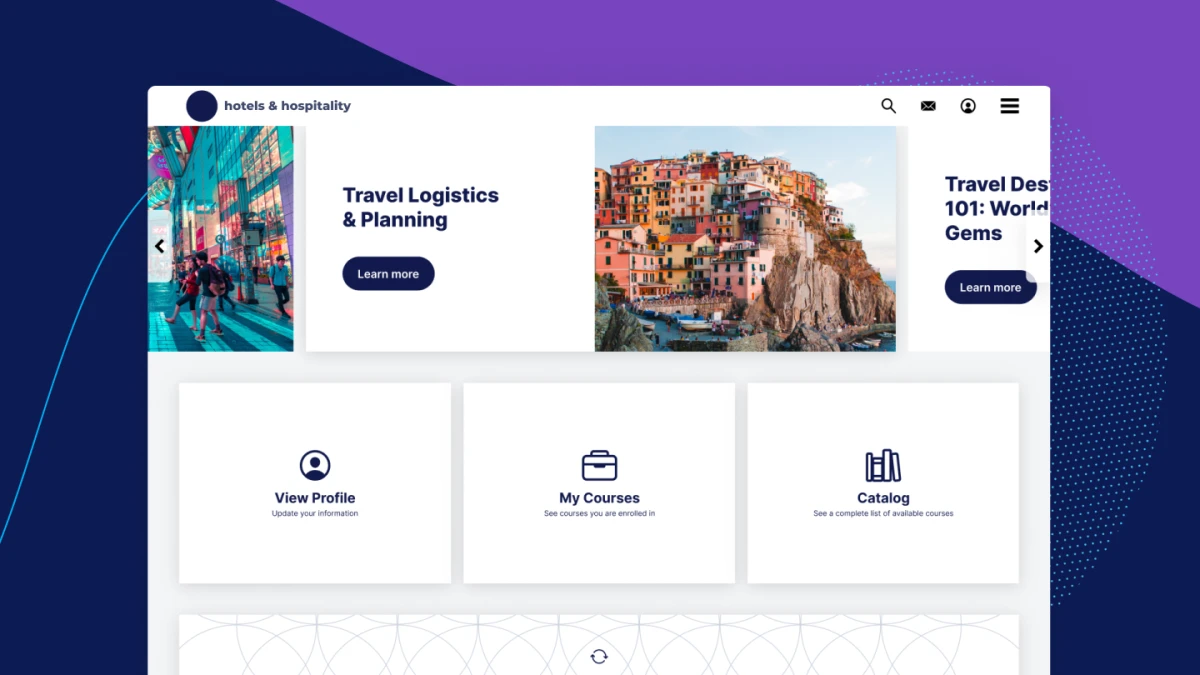The hospitality industry is known for its commitment to customer service and providing exceptional experiences to guests. And for good reason – globally, organizations risk 6.7% of their revenue, or $3.1 trillion, when they lose customers due to poor experiences.
But international hotel chains face a unique challenge: delivering a consistent customer experience while serving the specific needs of each location. In this blog, we’ll go over the main challenges faced by international hotel chains and explore how a hospitality learning management system (LMS) can be the key to overcoming them.
Challenges for international hotel chains
International hospitality chains often experience challenges meeting global standards while catering to local needs. Specific issues like centralizing training and meeting compliance add complexity to operations. But addressing these training challenges head-on enables hospitality businesses to support staff, customers, and ultimately – their company.
Meeting global standards and local needs
In the hospitality sector, striking a balance between global standards and local needs is crucial. While there are industry-wide training needs, different locations may have specific requirements based on cultural nuances or regional preferences. For instance, language barriers can hinder communication and understanding, making multilingual solutions necessary to cater to diverse staff members.
Centralizing training across locations
Another major challenge for global hospitality chains is centralizing training across locations. Coordinating training for staff members spread across various geographies can be complex and expensive. Scheduling changes, travel costs, and time zone differences make it difficult to deliver consistent training experiences. Moreover, training programs need to keep up with industry changes, including new property management tools, booking platforms, and guest service techniques. All of which adds another layer of complexity to centralizing training efforts.
Compliance with regulations and standards
Adherence to regulations is difficult in the hospitality sector – the challenge lies in keeping up with compliance protocols across regions. One example of this is safety standards. For instance, in the United States, fire sprinklers may be mandatory in all guest rooms, while some European countries might only require them in specific areas. Another example is data privacy. With the rise of data-driven operations, compliance with location-specific data protection laws requires specific training. Staff handling guest information in Europe will need specific training on the General Data Protection Regulation (GDPR), while their counterparts in California will need to understand the California Consumer Privacy Act (CCPA).
Solving global training challenges with a hospitality LMS
To address the challenges faced by your global hotel chain, implementing a hospitality learning management system (LMS) is key. An LMS is a centralized platform for managing ongoing training and development initiatives for hospitality professionals. The benefits of an LMS extend beyond compliance training, encompassing employee engagement, online training, and streamlined learning experiences.
The role of LMS in the hospitality industry
LMS software plays a vital role in training hotel staff and enhancing employee engagement. Using a single platform for training, an LMS ensures standardized knowledge across global chains. Employees can access training materials and complete courses online, enabling continuous learning and personal growth. An LMS also allows you to gamify learning, making training more engaging and effective.
Benefits of a hospitality LMS for global chains
Implementing a hospitality LMS brings several benefits to global chains in the industry. Some key advantages include:
- Centralized training courses: An LMS allows global chains to consolidate training materials in one platform, ensuring standardized knowledge and consistent training experiences across locations.
- Improved customer satisfaction: Well-trained staff members, equipped with the knowledge and skills acquired through an LMS, can provide better service, leading to increased customer satisfaction and loyalty.
- Enhanced staff members' skills: A hospitality LMS helps staff members acquire new skills, such as customer service techniques or industry-specific knowledge, contributing to their professional development and overall performance.
- Compliance content management: Regulations and compliance standards change often. An LMS simplifies the process of keeping training content up to date. New modules or revisions can be uploaded as needed, ensuring staff are always trained in the latest requirements.
- Mobile-first training: Hospitality staff are constantly on the move. A mobile LMS allows them to access training courses between tasks on their smartphones, maximizing convenience and minimizing disruption to their schedules.
- Microlearning for busy schedules: Long shifts in hospitality leave little time for training. Microlearning courses deliver bite-sized knowledge bursts that can be easily completed during breaks or downtime, making learning efficient and engaging.
- Scalable onboarding for seasonal fluctuations: Seasonal peaks require rapid onboarding. A hospitality LMS facilitates scalability by providing pre-loaded modules and automated workflows to ensure consistent training regardless of staff intake volume.
- Automated tracking and reminders: High staff turnover makes tracking certifications a challenge. Your hospitality LMS automates this process, tracking expiry dates and sending renewal reminders, saving time, and ensuring compliance.
Factors to consider when choosing a hospitality LMS
When selecting a hospitality LMS, your organization needs to find a platform that aligns with your requirements and objectives. Listed are some key features to consider.
Tailoring the LMS to your specific needs
Customization is key when it comes to selecting an LMS for your hospitality chain. Each location has unique training requirements for operations, staff, and customer service objectives. Some examples include:
- Customized training content: Customization allows you to create training materials that align with your desired customer experience, service protocols, and specific job roles. This ensures staff receive relevant and targeted training that enhances their performance.
- Multilingual support: For global hospitality chains with diverse teams across different regions, multilingual support bridges communication gaps and ensures consistent delivery of training content in various languages.
- Brand consistency: Personalizing the LMS interface with your company's logo, color schemes, and content tone helps maintain brand consistency. This reinforces brand identity among employees and fosters a sense of belonging to the organization.
Integration with existing systems
Seamless integration is vital for efficient training management. When considering LMS integration, several factors come into play:
- Data synchronization: Integration ensures that data such as employee records, training progress, and performance evaluations match across platforms. This eliminates manual tasks like data entry errors, ensuring reporting consistency.
- Streamlined processes: A well-integrated LMS automates tasks like user account creation, course enrollment, and analytics. This streamlines training workflow and saves time for both your administrators and employees.
- Improved accessibility: Integration allows employees to access training materials through platforms they’re already familiar with, enhancing user experience and increasing engagement.
Support and customer service
Finding an LMS provider that offers excellent customer service helps ensure successful system setup and ongoing management. A solid customer support staff usually comes with:
- 24/7 support availability: Opt for a provider that offers round-the-clock support to address any issues or questions promptly, regardless of the time zone.
- Comprehensive training programs: Look for providers that offer thorough training programs for administrators and users to support user adoption.
- Online resources and knowledge base: Access to online resources such as FAQs, tutorials, and knowledge bases empowers users to troubleshoot common problems independently.
- Regular updates and maintenance: Ask if the provider performs regular updates and maintenance to keep the LMS secure, efficient, and up to date with industry standards.
Tips for your LMS implementation
The successful implementation of a hospitality LMS requires careful planning and execution. Here are tips for a smooth implementation:
1. Localize content
Don't just translate your content – localize it. Be intentional about the training you're delivering to staff. Cultural nuances and regional regulations should be considered to make your training materials clear and relevant for employees. You can even make it a team effort and crowdsource training content. For example, encourage regional teams to contribute content specific to their needs and geographic contexts. This fosters a sense of ownership and increases relevance.

2. Prioritize communication
Keep your staff and stakeholders informed throughout the implementation process. Regular updates, clear communication channels, and addressing concerns proactively are crucial. Additionally, well-defined training materials will only help your teams get up to speed faster– so invest time in creating support materials for training
3. Measure KPIs
Once the hospitality LMS is implemented, measuring its success is crucial to ensure its effectiveness. Track key performance indicators (KPIs) like login rates, course completion rates, and time spent on modules. Analyzing this data helps you identify areas where the LMS is engaging employees and areas for improvement. For instance, low login rates might indicate usability issues, while low completion rates could point to course content that's too long or not relevant.
But the benefits go beyond the LMS itself. By connecting your LMS data with business-level metrics like staff skill development, employee retention rates, and even customer satisfaction scores, you can see the bigger picture. Improved staff knowledge and engagement can lead to better guest service, higher retention rates, and ultimately, a stronger business.
4. Collect employee feedback
To refine training courses to specific needs, utilize user feedback gathered from surveys. Employee input fuels ongoing platform enhancements. To collect user thoughts, engage learners in feedback loops to boost participation and support. You can also use post-training surveys to measure satisfaction levels and learning effectiveness.
Frequently asked questions
What features should a global chain look for when selecting a hospitality LMS?
Key considerations for global chains choosing a hospitality LMS include tailored content creation, seamless integration with existing systems, multi-language support, scalability for extensive teams, and mobile accessibility ensuring on-the-go training.
How can a hospitality LMS improve training and development for employees in global chains?
A hospitality LMS tackles the challenges of global training by offering a centralized platform with adaptable content. This fosters standardized training, personalized learning paths, and continuous skill development for a well-trained and engaged workforce across all locations.
How can a hospitality LMS help standardize training practices across different locations in global chains?
A hospitality LMS ensures consistent training across locations by providing a central hub for standardized content and assessments. This allows global chains to maintain a uniform brand experience while also catering to local regulations and cultural nuances.
Try Absorb learning management software
Whether you have a handful of locations or hundreds spread across the globe, Absorb LMS scales to meet your needs. Our platform can accommodate growing users and diverse training requirements. To learn more about one of the best learning management systems on the market, schedule a demo today.





